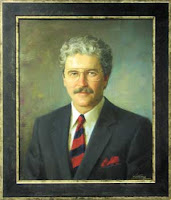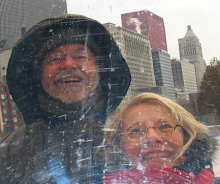We have a terrible infant mortality rate -- 6.3 per 1000 per year, over twice as high as the leading nations (Scandinavian countries, Singapore, Japan, Hong Kong). We're ranked somewhere below places like Slovenia, Portugal and -- yes -- Cuba. Check this out at any site you like; Wikipedia includes the list from the CIA World Factbook, which says we rank 46th in the world, just ahead of Belarus, Lithuania and Cyprus. (http://en.wikipedia.org/wiki/List_of_countries_by_infant_mortality_rate)
Do the conservatives disagree with this? No.
We have the highest health care bills in the world. (1) Many people don't have insurance to cover the cost of early tests and preventative care, so the ultimate costs of care are higher than they should be. (2) The overhead costs are way too high, due to the administrative costs of HMOs and other insurers, and because of an antiquated tort system which has driven the premiums for malpractice insurance through the roof.
Do the conservatives disagree with this? No.
Some of us (me included) have outstanding care -- I'm covered by Blue Cross / Blue Shield at a relatively modest cost, because my employer is fairly generous. I've never been turned down by my insurer for any test ever requested by my physician.
But I have friends who pay over $10,000 per year in insurance premiums -- healthy, retired people with no previous conditions. And we all know someone who has been denied a necessary treatment because of cost.
Do the conservatives disagree with this? No.
Inadequate support for preventative medicine and early treatment end up costing us billions. It's not clear how quickly those costs would drop under the president's plan. But over the long run, they're going to destroy us financially, unless we do something.
Do the conservatives disagree with this? No.
So, tell me, what did the conservatives propose after defeating Clinton's plan? Nothing. What do they propose now? Nothing. Why? Because they're frightened by the insurance companies and the pharmaceutical companies, who are spending millions to defeat a plan that will cost them profits -- profits that are part of our high health cost.
Many countries have successful systems that mix private options with public options. So do we - Medicare and Medicaid. It's funny how those who keep screaming that Obama wants to destroy your options aren't screaming about how we should eliminate the "socialist" Medicare and Medicaid programs. Those programs have been the only thing between many elderly people and poverty.
Do the conservatives disagree with this? No.
I don't know the solution to the health care problem. But an honest discussion of options would seem a logical thing for us to engage in. With regard to a public option that would force the insurance companies and drug manufacturers to compete -- isn't that one of the Republicans favorite words? It seems to me something that deserves serious consideration at the least.
I ask again, one last time, what do conservatives propose to do?
I don't know the solution to the health care problem. But an honest discussion of options would seem a logical thing for us to engage in. With regard to a public option that would force the insurance companies and drug manufacturers to compete -- isn't that one of the Republicans favorite words? It seems to me something that deserves serious consideration at the least.
I ask again, one last time, what do conservatives propose to do?


























